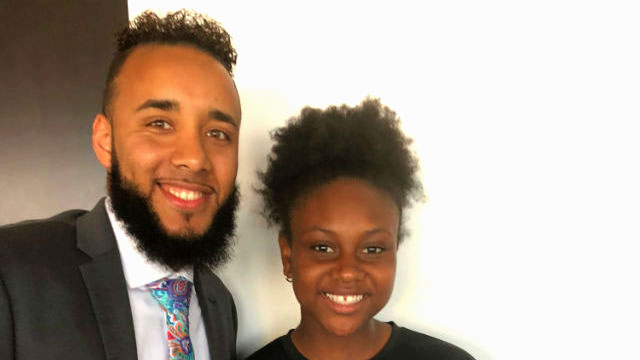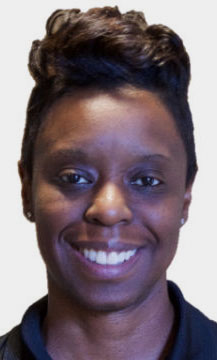Through trainings that welcome difficult conversations, the Center for the Study of Sport in Society fosters social change.
The Center for the Study of Sport in Society provides training to youth programs and other partners to help them give young people opportunities to explore their potential and develop the skills to be successful.

Growing up in a rough section of Boston’s Dorchester neighborhood, law enforcement officer Jeffrey Lopes (pictured above) says, “I saw a lot.”
His experience included losing friends to guns and gangs, and it forged a perspective that he points out can’t be learned from books.
“I bring the perspective of empathy and understanding what people have been through and taking away some of the labels and stigmas that have been attached to certain people by other people,” Lopes says. “Growing up in an urban setting, going to an urban school district, I’ve seen some of these challenges first-hand. And that’s where I see a lot of challenges in policy: a lot of people who do this work have never experienced it. They’re scholars, but they’re not practitioners of the system.”
Lopes, who is the founder of the We Belong: Empowering Youth Through Leadership program and is pursuing a doctorate of law and policy at Northeastern University College of Professional Studies, likes the idea of combining theoretical and experiential learning. It’s one reason he believes the university’s Center for the Study of Sport in Society is an essential institution. And for Lopes’ We Belong program — which creates opportunities for young people to engage in their communities, to connect with police officers in a friendly context, and to explore who they are and who they want to be — the Center has been a key partner.
“The Center has played a vital role in the leadership programs that I run,” Lopes says. “By talking to young people about some of the stereotypes and stigmas that they have, and helping them break that down, it changes people’s mindsets. The Center’s trainers have helped us connect with young people, because they’re coming from a whole different perspective as to who are we, how should we act, how do we give out unconscious bias, and how do we look at things through an empathy lens, versus just looking at what’s on the surface.”
The Center seeks to harness the power and appeal of sport as a catalyst for social justice. According to Executive Director Dan Lebowitz, “We are a solution-based organization focused on how education moves people to a new level of cognizance, a new level of consciousness, and a new level of empowerment that will create change. In a world too readily defined by divisiveness, inequality and disenfranchisement, the Center finds its charge in the positivity of Dean Mary Loeffelholz’s embrace of ‘inclusive prosperity’ and in creating large and ever-increasing portals of equity amidst the norm of inequality. This is our mission, our passion and our sustainable outcome.”
Founded in 1984, the Center’s goals include fostering diversity, creating gender equity, preventing interpersonal violence, challenging racism, sexism and heterosexism, and empowering sport-based youth development networks. It pursues these aims through research, education and advocacy, and its success is reflected in the range of its clientele; the Center has delivered customized trainings to every major college conference, to preparatory schools, to all branches of the U.S. military, to Major League Baseball, to the National Football League, at the South African World Cup, to recidivism prevention programs, to community groups, to police departments, to youth offender programs and, in partnership with the Attorney General and the New England Patriots’ Charitable Foundation, to over 100 high schools in Massachusetts.

Fundamental to its success has been the expertise and influence of the Center’s staff, all of whom are trained in its unique approach, and all of whom are athletes. Assistant Director of Training, Lisa Markland ’97 (pictured at left), was originally recruited at Northeastern for her skill in the high jump. A former New England champion and two-time America East champion, Markland still holds the high-jump record at Northeastern. She is also someone for whom the drive to help others kicked in at an early age.
“From when I was very young,” Markland says, “if I saw somebody who was being bullied, or who didn’t have what they probably should have — whether they looked disheveled, or they were my friend who was sad because they were hungry — I didn’t really like that. I was always sticking up for someone who was being bullied or who wasn’t included in a game. And then it just kind of carried on through college. If someone was in need, they could sleep on my couch, or we could cook some food. [At first], I thought I was going to be a cop, and that’s how I was going to help. But then the human services thing came in.”
After graduation, Markland worked for several years at the Massachusetts Department of Social Services as a social worker. She then served as program coordinator for Boston’s Roca’s Youth Star program, helping disenfranchised young adults gain life skills and critical credentials such as their GEDs. For the past 15 years, she has worked as a facilitator for the Center for the Study of Sport in Society’s nationally accredited Mentors in Violence Prevention (MVP) program.
According to Lebowitz, Markland’s talent for teaching, and for connecting with people on a personal level, has made her an invaluable member of the Center’s team.
“Lisa has an amazing ability to adapt the curriculum,” Lebowitz says. “She can go into any room and succeed. There is something about her ability to engage people at their basic human level that I’ve never seen.”
Recently, Markland had the opportunity to test her skills in another context, when she and colleague Sam Straus (now a lecturer at Harvard’s Graduate School of Education) traveled to Australia’s island state of Tasmania to facilitate a training at a women’s shelter there. Despite some culture shock, Markland says, what was most eye-opening were the similarities.
“They do some things differently,” she says. “Some of the language is a little bit different. But it was also not different. Sam and I were struck that we were across the world and they were having the same issues that we have here. You think it’s going to be different. But abuse is abuse. The stages of abuse are the same no matter where you go.”
According to Markland, finding such common ground is one key to the workshops she leads. Another is helping participants find their own voices and styles.
“The difference with our trainings,” she says, “is that we’re really facilitating a conversation. We know our curriculum and we do have a flow in our curriculum, but we facilitate it in a way that people are actually running the training. We may narrate a little bit, facilitate a little bit, throw some thoughts out there, but then we allow the group to have the dialogue, and that actually forms the experience of the training.”
In thought exercises and discussions, participants explore what leadership and other concepts mean to them individually, and the various ways that bystanders can respond when they see problems in the real world. Markland notes that effective action can take many forms.
“How you’re going to show up when you see something that is problematic depends upon who you are,” she says. “Your form of leadership might be, ‘I’m not going to put myself in a dangerous situation because I have family who are depending on me to get back home.’ Or it might mean that there needs to be some engagement. It might mean that you take some information, so that when the police come you’re able to give them information. It might mean you call the police. It might mean you take a picture. We talk about the gamut of options that people have.”
While the Center doesn’t teach athletics, they are at the heart of what it does, both in the way that it leverages the influence athletes have and because Center staffers often train the leaders of organizations that do focus on athletics. In the process, it helps them grapple with some tough questions.
“Are kids of different economic and different racial backgrounds getting the same access to fields?” Lebowitz asks. “Are they getting the same access to equipment? We’re still involved in all of those things, but we no longer roll out a ball. We roll out curriculum that changes the way that the organizations that do roll out a ball think about what impact means on a sustainable level for their kids. And I think athletes have a unique voice that kids often understand and like to listen to.”
For Officer Lopes and We Belong, where programming often involves basketball, dodgeball and other games, the Center’s essential contribution is in the dialogue it helps to create and the growth such dialogue can spark. As he works to finish his doctorate and considers the next chapter, Lopes says that his own experience at the Center has had a profound effect on him — one he hopes to carry forward.
“Being in that training and having them break down all the different levels of social justice: how you view people, how you should view people, and how you should connect with people versus the way you do it — it was very, very impactful,” Lopes says.
“It’s important,” he adds. “It’s about continuing that conversation, so that everyone has a seat at the table.”